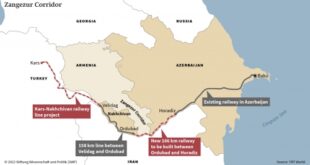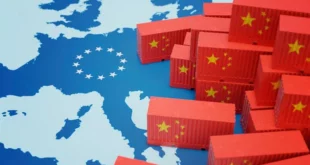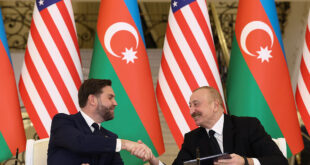 Russia has sent a missile cruiser and two other ships to a Georgian port, while a US military ship has docked at another southern port in a show of force amid an escalating standoff with the West over a nation devastated by war with Russia.
Russia has sent a missile cruiser and two other ships to a Georgian port, while a US military ship has docked at another southern port in a show of force amid an escalating standoff with the West over a nation devastated by war with Russia.
The dockings came a day after Dmitry Medvedev, the Russian president, recognised the two Georgian breakaway territories of South Ossetia and Abkhazia as independent states, prompting harsh criticism from Western nations.
Â
Georgia reacted by recalling all but two diplomats from its embassy in Moscow.
Â
The US Coast Guard cutter Dallas, carrying 34 tons of humanitarian aid, docked in the Black Sea port of Batumi, south of the zone of this month’s fighting between Russia and Georgia.
Â
The arrival in Batumi avoided Georgia’s main cargo port of Poti, which is still controlled by Russian soldiers.
Â
The US embassy in Georgia had earlier said the ship was headed to Poti, but then retracted its statement.
Â
Zaza Gogava, the head of Georgia’s joint forces command, said the port in Poti could have been mined by Russian forces and still contained several Georgian ships sunken in the fighting.
Â
Poti’s port reportedly suffered heavy damage from the Russian military.
Â
In addition, Russian troops have established checkpoints on the northern approach to the city and a US ship docking there could have been seen as a direct challenge.
Â
Meanwhile, the Russian missile cruiser Moskva and two smaller missile boats are anchored at the port in Sukhumi, the capital of Abkhazia, some 180 miles north of Batumi.
Â
The Russian navy says the ships will be involved in peacekeeping operations.
Â
Although Western nations have called the Russian military presence in Poti a clear violation of a European Union-brokered ceasefire, a top Russian general has called the US practice of using warships to deliver aid “devilish”.
Â
Colonel General Anatoly Nogovitsyn warned that Nato has already exhausted the number of forces it can have in the Black Sea, according to international agreements, and warned Western nations against sending more ships.
Â
“Can Nato – which is not a state located in the Black Sea – continuously increase its group of forces and systems there? It turns out that it cannot,” Nogovitsyn said.
Â
Many of the Russian forces that drove deep into Georgia after fighting broke out on August 7 in South Ossetia have pulled back, but hundreds are estimated to still be manning checkpoints that Russia calls “security zones” inside Georgia.
Â
European leaders responded to the moves on Wednesday by raising fears that Russia could set its sights on other neighbouring countries after its stated recognition of the two breakaway regions.
Â
Ukraine and Moldova are both vulnerable, Bernard Kouchner, the French foreign minister, said as condemnation from Western countries, including China, continued about Russia’s actions.
Â
Russia has breached international law by recognising the independence of South Ossetia and Abkhazia, Kouchner said in a French radio interview.
Â
“It’s very dangerous. There are other objectives that one can suppose are the objectives of Russia, in particular Crimea, Ukraine and Moldova.”
Â
On a visit to Kiev, David Miliband, the British foreign secretary, warned the Ukraine government against provoking Russia.
Â
He said Ukraine must act “not to provide any pretext for Russian actions because of course the Russians have used those pretexts in the Georgian case and it’s important to not repeat that”.
Â
The southern Ukrainian region of Crimea is mainly populated by ethnic Russians and houses the Russian Black Sea fleet at Sevastopol.
Â
Transdniestr, in eastern Moldova, fought a brief independence war after the Soviet Union’s collapse but is not internationally recognised.
Â
It hosts a contingent of Russian troops.
Â
The European Union should clearly support Ukraine’s membership of the bloc to prevent it from becoming a Russian target, Olli Rehn, the EU enlargement commissioner, said.
Â
“Ukraine could be the next target of political pressure by Russia, whose doctrine on its nearby neighbours is reminiscent of sphere politics,” Rehn said in a speech to Finnish ambassadors.
Â
The Georgian conflict was a stark reminder that Russia is the EU’s biggest foreign policy challenge, he said.
Â
Meanwhile, in the village of Karaleti near the border with South Ossetia, several prisoners were exchanged between Georgia and Ossetian forces.
Â
Some 85 Georgian civilians who were detained and kept in South Ossetia’s capital Tshkinvali were transported on yellow buses across the border and delivered to the town of Karaleti.
Â
They were reportedly the last of a group of Georgian civilians who were captured during the conflict.
Â
But there is still an undisclosed amount of Georgian soldiers being held, according to the Georgian parliamentary defence and national security committee.
Â
The release was in exchange for some 13 Ossetians, including four soldiers, some of whom were jailed by Tbilisi prior to the conflict on terrorism charges.
Â
Also on Wednesday, Georgia’s prime minister said the war with Russia had caused about billion in damage but did not fundamentally undermine the small country’s economy.
Â
Georgia’s entire national budget for last year was about billion, and Georgia is hoping for substantial economic aid from the West to help it recover, said Lado Gurgenidze.
Â
Reuben Jeffrey, the US undersecretary of state for economic affairs, is leading a US delegation examining Georgia’s postwar economic recovery needs.
Â
Agencies
 Eurasia Press & News
Eurasia Press & News



